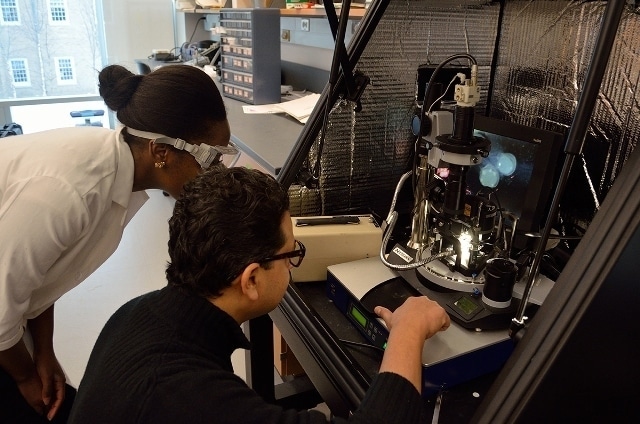Apr 6 2016
Faculty members from Cornell University are the main contributors of a new $317 million public-private collaboration, aiming to speed up innovations in the field of “smart” fabrics that can be adapted for use in apparel, electronics, consumer products, transportation, and protective gear for first responders and soldiers.
 Soshana Smith '09, M.A. '12, a doctoral student in the field of fiber science, and Juan Hinestroza use atomic force acoustic microscopy to measure properties of bicomponent fibers in Hinestroza's Textiles Nanotechnology Laboratory. (Photo credit- Mark Vorreuter/Human Ecology)
Soshana Smith '09, M.A. '12, a doctoral student in the field of fiber science, and Juan Hinestroza use atomic force acoustic microscopy to measure properties of bicomponent fibers in Hinestroza's Textiles Nanotechnology Laboratory. (Photo credit- Mark Vorreuter/Human Ecology)
The Advanced Functional Fabrics of America (AFFOA) Institute is a not-for-profit venture, headed by the Massachusetts Institute of Technology. This was announced on April 1 by U.S Secretary of Defense Ashton Carter. This venture promises to speed up innovations in manufacturing and fiber science that will lead to fabrics that see, hear, communicate, sense, store and convert energy, monitor health, regulate temperature, and alter color.
The venture is already supported by $75 million in competitively provided federal funds. It is also backed by $242 million funds procured from over 85 academic and industry partners. AFFOA is working towards a national network to interlace innovation into all steps of the fabric supply chain, including innovative digital tools for design and measurement of apparels, rebooted manufacturing processes and training, functional fibers integrated with unique properties, and technical education of textile workers.
Cornell is one of the AFFOA founding partners and joins 32 universities to direct a coordinated testing, research, and development of innovative fabrics, fibers, and textiles. Juan Hinestroza, associate professor in the Department of Fiber Science & Apparel Design in the College of Human Ecology, has plenty of experience working with partners at MIT, the University of Tennessee, Drexel University, and other institutions to organize AFFOA’s concept paper and final proposal.
With the creation of AFFOA, we are taking a major step forward in revolutionizing the textile industry and speeding scientific breakthroughs that will transform many aspects of our society, as textiles are all around us – in toothbrushes, pillows, car seats, airplanes, protective gear, fashion and more. I am pleased that Cornell can contribute some of the best textile and fiber testing and research facilities and experts in the nation to this effort.
Juan Hinestroza, Associate Professor, Department of Fiber Sciences and Apparel Design, Cornell University
Professors from fiber science, engineering, and computer and information science at Cornell are supporting an AFFOA core proposal to develop a comprehensive and interactive tool to identify basic properties of textiles and fibers.
Cornell has created some predictive modeling algorithms that have been included, along with others, to simulate the way textiles will look, move, and feel on a human body prior to their manufacture.
We aim at simulating all aspects of textile production from molecular structure, processing into fibers, manufacturing into fabrics and performance in real-life environments. This knowledge repository will significantly improve the efficiency of the American textile industry, allowing for rapid selection of materials and manufacturing techniques for new generations of textile and apparel products.
Juan Hinestroza, Associate Professor, Department of Fiber Sciences and Apparel Design, Cornell University
The leaders at AFFOA believe that in the following 10 years, the institute will create as many as 50,000 jobs across the fashion supply chain. Cornell is likely to contribute to training for New York-based workers in collaboration with the Empire State Development’s Division of Science, Technology and Innovation, NYSTAR, and the statewide network of community colleges.
I was impressed by the incredible support for this endeavor shown by the Defense Secretary, as well as governors and leaders of the many states and institutions involved, including a large number of industry representatives.
Anil Netravali, Jean & Douglas McLean Professor in Fiber Science and Apparel Design, Cornell University
AFFOA is now the eighth Manufacturing Innovation Institute started under the 2014 Revitalize American Manufacturing and Innovation Act (RAMI) launched by U.S. Rep. Joe Kennedy III, D-Mass and U.S. Rep. Tom Reed, R-N.Y. RAMI aims to produce a network of regional manufacturing institutes in the US to support local production, increase workforce development, and drive innovation.
I am pleased to learn that the Advanced Functional Fabrics of America coalition, led by MIT in partnership with Cornell, has received a $75 million award from the Department of Defense. I care about bringing quality, advanced manufacturing jobs to our region. I am proud to work with colleagues across the aisle to support projects like this through my and Joe Kennedy’s Revitalize American Manufacturing and Innovation Act. I am thrilled that DOD recognizes the high caliber of the research institutions, businesses and workforce of our region and look forward to the success of this initiative.
Tom Reed, U.S. Rep, R-N.Y.